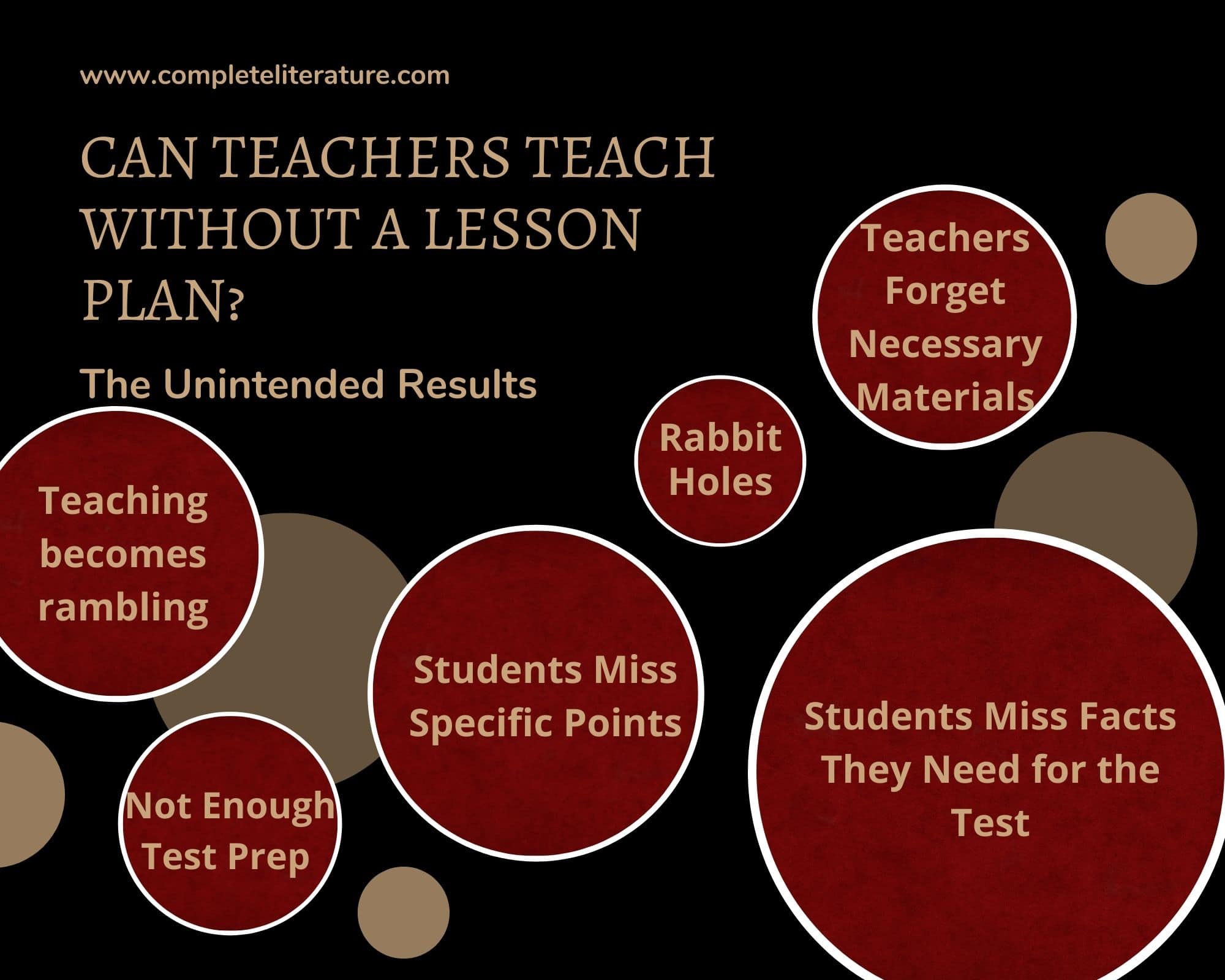Lesson planning takes a long time, especially for newer teachers. And most teachers are already facing a deficit in time. Sometimes there is a temptation to teach without a lesson plan, especially when teachers have been teaching their material for a long time. They figure that since they have taught those lessons for so long, surely they can teach it again in their sleep.
So can a teacher teach without a lesson plan? The answer is yes, they can absolutely teach without a lesson plan. BUT…their lesson will most likely be dotted with empty space, lacking in enthusiasm, missing details you would have wanted to cover, and leaving the students less than excited about what they are learning, among many other issues. And actually, there are some great ways to make lesson planning quicker and easier than ever!
Table of Contents
Yes, But…
How do I know this? Because I’ve done it! I think we have all tried to do this, thinking that we already know the material and have already taught it multiple times. Surely, once we get going, the flow will take over and everything will be fine. And honestly, it can be. The times that I did it disaster didn’t happen by any means.
But what I did notice was that the lesson as a whole lacked dimension. I was focused more on keeping things going than on the lesson points and how the students were absorbing it. And it just fell flat. It was literally just a meh class.
So combining my experience with what the experts say, I came up with the following issues that teachers face when they teach without a lesson plan:
- Teaching tends to become rambling talk rather than specific points.
- Students will have more difficulty picking up those specific points.
- Teachers could likely forget support materials that they needed to teach the class(es).
- The teacher as well as the students end up going down rabbit holes.
- Students didn’t learn what they needed to for the test.
- Students can become bored and unengaged, and potentially badly behaved.
Let’s go ahead and look more specifically into each one of these points.

Teaching Tends to Become Rambling Talk Rather Thank Specific Points.
As teachers, the vast majority of us know that we can fill an hour-long class period with words. This is especially true in middle school when we open up the discussion to the students. It can go on forever!
But is all of that talk exactly what the students need to be focusing on? Probably some of it is, and maybe even a good amount of it. But one of the biggest problems in school is communicating everything that needs to be taught in the course of a school year.
Books never get finished. Difficulties in learning, storm days, and behavioral issues among many other things distract teachers from getting everything taught. So having an unplanned class will actually contribute to the time shortage in ways that will have a devastating effect on the classroom over time.
This will also make testing more difficult. If you don’t have lesson plans written that delineated exactly what you covered in class, it will be hard to write tests that cover exactly what teachers need to. and for the case of tests that are already written ahead of time, if teachers are teaching without a lesson plan, they could be missing important points that were covered on the test.
Students Will Have More Difficulty Picking Up Those Specific Points
Many times, having an extended classroom discussion can be perfect for the classroom. This is especially true when the teacher has a lesson plan with specific points that need to help guide that conversation.
Keeping those points in mind will help the students to focus better on those points, which will help them pick them up better as well as reinforce them through classroom discussion.
But if the conversation has no guide and the teacher isn’t keeping it on point, it merely becomes casual conversation and no longer a productive class. And the students will not be learning the specific points they need for the test. Even if you happen to cover those points, they won’t be emphasized enough for the students to get reinforcement.
Teachers Could Likely Forget Support Materials That They Needed to Teach the Class(es)

I have to admit that I can be a scatterbrain. Even when I bring all of my stuff, it seems like nearly daily I am searching for something that I was sure I put somewhere but then can’t find it in that specific location. Please tell me I’m not the only one that does that!
When a teacher teaches without a lesson plan, they forgo the opportunity to formulate that list of needs and put it together.
I always keep a specific list of items needed on all of my lesson plans. It takes a few minutes longer to do but it makes such a good checklist. And I also keep a particular bag handy for all of my “extra supplies.” That allows me to find what I need for that day in that one spot. No more looking for that elusive little thing!
I will use that checklist once I am in class for the day once more. That allows me to gather all of the items that I knew were already in the classroom as well as anything I needed to bring from home. And everything is together for the day!
While this works well for me, I am sure you all have even more great ideas–feel free to share!
The Teacher as Well As the Students End up Going Down Rabbit Holes
We all know that one thing leads to another. This is especially true when you are teaching a middle school class in any subject. But it is even more true when the teacher teaches without a lesson plan. You bring up a point and a student chimes in with a great supporting thought. Then another student tells you what that reminds them of. Which then prompts another student to tell you how that reminds them of what they had for dinner last night. Yet another student contributes their experience at the movie theater the previous weekend.
Yes, this exact progression happens frequently in my class if I don’t reign in the conversation quickly. The sad part is, I wish that I could let them keep going. They are enjoying the time as well as me. and we are all getting to know each other better. But unfortunately, that is not the subject of the class and we have to get it back on track quickly.
The good thing is that there are other opportunities during the day to allow those rabbit-hole conversations that middle school students love to go down so much.
Students Didn’t Learn What They Needed to for the Test
This is probably the biggest reason to make sure that you have a great lesson plan that is easy to stick to throughout the class. When teachers try to wing it, they can forget important points that need to be covered for the test. I already touched on that above.
But a critical problem with this scenario is that when teachers teach without a lesson plan, they may not even realize what points they did or didn’t cover throughout the class. Because conversation can get so casual with no outline to guide the class, teachers can’t remember everything that was talked about. (At least that’s true for me–my brain hasn’t kept up in years).
Because the teacher doesn’t remember everything that was touched on, it could be nearly impossible to remember if they covered all of the necessary points for the test. This is especially true if the teacher doesn’t have the test handy to see exactly what is on it. And generally, teachers don’t have the tests sitting out to make sure they cover everything. That is why the lesson plan is so critical to reaching those points.
Another great advantage of having a clear lesson plan with specific points is that the teacher can put those on the board as they come up–even more reinforcement that the students can tangibly take in.

Students Can Become Bored and Unengaged, and Potentially Badly Behaved
One last important point I would like to share regarding teaching without a lesson plan is how easily the teacher can lose control of a class that does not have a specific guide to follow. Because the teacher could likely go off topic or have to pause to remember what he/she has covered and what he/she still wants to cover, time is lost in the teacher trying to rethink the direction of the class. Having any down time, regardless of what age is being taught, can be deadly to the class vibe. And once the teacher loses control, getting it back can be so difficult if not impossible for the remainder of the class.
Another time this presents a problem is when you are differentiating the class and you have multiple groups doing different things. If you don’t have it all lined out in the lesson plan, you will not be able to quickly move through the different stations or stages of the class.
A Surprise in the Research
Interestingly, when I was researching this topic to add to my opinion and experience, I ran into a study that was done by a William & Mary grad student. (Shout out to College of William & Mary, where my son is currently working on his masters!)
Anyway, in this study, the research indicated that more teachers believe that an excellent assignment is more important than an excellent lesson plan. I am not sure how I feel about that. I do know that an excellent lesson plan can give the student the foundation for putting what they have learned into an amazing assignment. The two work together for the best experience. I don’t know that one or the other alone can carry the best overall experience.
It is definitely something I would love to look into more.
Conclusion
So can a teacher teach without a lesson plan? Of course. But these are some of the most important reasons that teachers need to have a lesson plan. Honestly, this crosses professions as well as life in general. Without a plan, none of us are as good as we think we are. Can we pull it off? Sure. And sometimes we can even do a great job of it. But will it be our best job? Probably not.
I know that after every single class, I tend to beat myself up over the mistakes I made. Either I didn’t mention something I wanted to, or time got away, or any number of things can make the class less perfect. This occurs even when I have followed an excellent lesson plan. But it happens much more when I didn’t follow the lesson plan well or didn’t bother to use a lesson plan at all.
How did things go for you when you didn’t teach with a lesson plan? Or when you taught using an old lesson plan that you didn’t review before class? Feel free to leave a comment regarding what issues have come up for you in your lesson planning experience!
If you enjoyed this article, I think you will also love the following articles:
Why Teachers Hate Lesson Planning and How to Grow to Love It
How to Hook Students Instantly: The Anticipatory Set
Lesson Plans and Curriculum: The Story of Complete Literature




I remember when we were studying for Montessori teachers training, Making lesson plans were the most talked about subject. And we loved decorating them. This refreshed so many memories
I’ve never thought about this before. Before I started reading your posts, I never knew just how much planning teaching really took.
This was such an interesting read! Looking back on my high school days, I think I know which teachers had fully developed lesson plans and which ones didn’t. LOL
Lol. Exactly, Surekha!
The phrase “Fail to plan, plan to fail,” comes to mind. I think if it is something you have taught over and over again, it would be doable, but then again, by that point, you pretty much already have a lesson plan in your head, so you still have a plan, haha. I would think it would be very difficult to get the point across for new topics. Honestly, I don’t see why, you wouldn’t have a lesson plan.
You are exactly right, Matt.
oh gosh. as a new teacher, there was a day when i did not prepare enough for a full class session. so down the rabbit trail i went. :O learned my lesson, lol.
It really does take a lot of work to make sure that the class is getting all that they need. I respect teachers so much!
I think she can still teach without a teaching plan however the quality wouldn’t be the same. I know it’s hard to teach without a proper plan.
I definitely think it would be challenging to teach without a plan. planning is important and helps the the teacher make sure the students are getting the info they need.
My daughter’s teachers always communicate in advance their lesson plan for the next month. I love that because it allows me to be helpful with homework and be a valuable partner in my child’s learning.
Deffo think a plan is best, as it makes best use of the time and creates some structure to the lesson contents too x
It seems to me that only an experienced teacher can improvise and teach a topic without a plan. It is very difficult for beginners to calculate the right time to be in time. I’m for the lesson plan!
I would not do well without some kind of outline. I’ve been running the same tours since 2018 and still look at my outline before I start.
I think she can teach however it’s a bit difficult! It’s feasible but training and teaching plan really helps in guiding the lessons.
It is always good to have a plan for everything! I can’t imagine a teacher being very effective without a lesson plan in place for the school year.
it def can be done but i think having a lesson plan is better.
Yes, I agree, initially when you are starting your first classes as a teacher planning is very important and to ensure all resources are with you. I think as time goes on with experience, things are much easier.